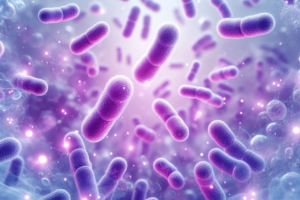The digestive system is a very essential part of the human body and is responsible for the absorption and breakdown of all the nutrients from the food we eat. However, many diseases can affect this vital system, causing pain, discomfort, and even more harmful or life-threatening conditions. Gastrointestinal diseases refer to a range of conditions that affect the digestive system, including the oesophagus, stomach, intestines, liver, and pancreas. This type of disease can cause substantial morbidity, mortality, and financial burden on individuals and the healthcare system.1
Gastrointestinal Disorders
There are two types of gastrointestinal diseases: Functional gastrointestinal diseases and structural gastrointestinal diseases
Functional gastrointestinal diseases (FGIDs)
Functional gastrointestinal disorders are a group of health conditions that are characterized by several abnormalities that can contribute to digestive issues, such as increased inner organ pain sensitivity, disturbed motility, modified gut microbiota, and altered immune and nervous system functioning. Following are the major types of digestive system diseases/disorders:
- Celiac disease: A chronic digestive disorder that affects the small intestine. This disease occurs when gluten triggers an immune response that damages the small intestine linings. Symptoms include abdominal pain, constipation or bloating, fatigue, and diarrhoea.
- Peptic ulcers: Peptic ulcers are open sores that can develop on the lining of the small intestine or stomach. It can cause discomfort, nausea, and other gastrointestinal symptoms. Common risk factors for peptic ulcer include infection with Helicobacter pylori (H.pylori) bacteria and regular use of nonsteroidal anti-inflammatory drugs (NSAIDs), alcohol consumption, smoking, and stress.
- Pancreatitis: It is a condition that occurs when the pancreas, which is responsible for producing digestive enzymes and hormones like insulin, becomes inflamed. This can cause damage to organs and surrounding tissues that may lead to severe pain or life-threatening complications.
- Gastroenteritis: A term that is used to describe inflammation and irritation of the gastrointestinal tract. And can be commonly known as “stomach flu” or “food poisoning”. The causes can be parasitic, bacterial, and also viral infections.
- Gallstones: Gallstones are basically hardened, small deposits of digestive fluid that can form in the gallbladder. It can vary in size and shape from a grain of sand to the size of a ball. Can cause symptoms such as discomfort or abdominal pain.
- Gastroesophageal Reflux Disease (GERD): GERD is a digestive disorder that can affect the lower oesophageal sphincter, causing stomach acid and food acid to flow back into the esophagus. This can result in chest pain, heartburn, difficulty swallowing, and some other uncomfortable symptoms.
- Irritable Bowel Syndrome (IBS): IBS is a digestive disorder that affects the large intestine. It can be characterized by bloating, gas, diarrhoea or constipation, cramping, and abdominal pain.
- Colorectal Cancer: It is a type of cancer that affects the colon or rectum, which are parts of the digestive system. This type of disease can develop over a long period of time and may not show any symptoms in its early stages. As it progresses, various symptoms may indicate colorectal cancer.
Symptoms of Gastrointestinal Diseases2
Gastrointestinal or digestive diseases are disorders that are related to the digestive tract. Most of the time, the following symptoms are the initial indication of digestive tract disorders:
- Constipation
- Bloating
- Bleeding in stool
- Heartburn
- Diarrhoea
- Incontinence
- Nausea and Vomiting
- Weight gain/loss
- Stomach ache
Causes and risk factors for digestive issues
Many factors may be responsible for contributing to one or more digestive issues, such as:
- Environmental toxins/factors (air pollution, climate change, water quality)
- Certain health conditions (Anxiety, diabetes, multiple sclerosis, hypothyroidism, and depression)
- Certain medications, such as antidepressants, antacids, anticholinergics, antibiotics, antihypertensives, NSAIDs, and opioids.
- Chronic stress
- Sleep disorders and/or insufficient sleep
- Poor dietary habits such as large meals, insufficient dietary fibre, chronic/ excessive intake of alcohol, carbonated beverages, and saturated fats.
- Smoking
- Inactivity or excessive strenuous exercise
Current treatment options for functional gastrointestinal disorders (FGIDs)3
Treatment may vary from person to person. As there are many different types of FGIDs. Treatment options/remedies include lifestyle/behavioral changes, mental well-being management and medications/pharmacotherapies.
Lifestyle change treatments4
There are various aspects of your lifestyle to be considered when treating FGIDs.
- Sleep: Quality sleep is helpful in this condition.
- Exercise: At Least 20-30 minutes a day helps to lower stress and improve symptoms.
- Diet: A proper, nutritious diet can keep the disorders away.
- Caffeine: Avoiding caffeine as it causes diarrhea and can disrupt sleep.
- Alcohol: This acts like a depressant and can cause indigestion and reflux.
Mental well-being treatments
There are several therapies that reduce symptoms, including:
- Hypnotherapy: Can reduce anxiety around symptoms and calm the stomach
- Mindfulness: Can help to stay consistent in the moment and worry less.
- Cognitive behavioral therapy: Help to recognize and understand unhelpful thought and behavior patterns.
- Psychotherapy: Talk therapy can work to give insight and perspective.
Medications
Following are the medications that are available over the counter or require a prescription. Some of the first and second-line medications that are recommended for FGIDs are:
- Loperamide and ondansetron, used for the treatment of diarrhoea
- Osmotic laxatives and prucalopride for the treatment of constipation
- Antispasmodics and some of the neuromodulators (such as antidepressants) are used to treat abdominal pain.
- Proton pump inhibitors, H.pylori eradication therapy, H2 blockers, and prokinetics are used for treatment of indigestion.
Takeaway
Gastrointestinal disorders are very common and can have a great impact on our everyday activities. Can affect a large amount of the population and includes a variety of conditions, from IBS and functional diarrhoea to vomiting and constipation. A few of the recommended medications are very helpful and can be the best treatment option to overcome gastrointestinal disorders.
References:
- Wang T, Liu K, Wen L, Yang Y, Yin X, Liu K, Chen Y, He Y, Yang M, Wei Y, Wang B, Chen D. Autophagy and Gastrointestinal Diseases. Adv Exp Med Biol. 2020;1207:529-556. doi: 10.1007/978-981-15-4272-5_38. PMID: 32671773.
- Holtmann G, Shah A, Morrison M. Pathophysiology of Functional Gastrointestinal Disorders: A Holistic Overview. Dig Dis. 2017;35 Suppl 1:5-13. doi: 10.1159/000485409. Epub 2018 Feb 8. PMID: 29421808.
- https://www.healthline.com/health/digestive-health/functional-gastrointestinal-disorder#treatment
- Singh R, Zogg H, Ghoshal UC, Ro S. Current Treatment Options and Therapeutic Insights for Gastrointestinal Dysmotility and Functional Gastrointestinal Disorders. Front Pharmacol. 2022 Jan 25;13:808195. doi: 10.3389/fphar.2022.808195. PMID: 35145413; PMCID: PMC8822166.
- https://www.metropolisindia.com/blog/preventive-healthcare/top-9-diseases-of-the-digestive-system/
- https://fullscript.com/blog/lifestyle-tips-for-digestive-health
- Fikree A, Byrne P. Management of functional gastrointestinal disorders. Clin Med (Lond). 2021 Jan;21(1):44-52. doi: 10.7861/clinmed.2020-0980. PMID: 33479067; PMCID: PMC7850201







